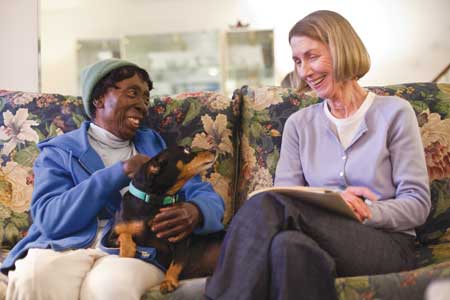Defeating Depression in Later Life
by Teddi Fine

America is aging. The first of the baby boom generation are now eligible for Medicare; by 2030, 72 million—one in five Americans—will be over 65. As boomers are learning, getting older means greying hair or losing hair; it means increased wrinkles and slowed metabolism. But depression, described by Winston Churchill as “the black dog,” absolutely isn’t either normal or a natural part of later life. It’s a real, treatable illness from which people, including older adults, can and do recover.
Sociologist Laura N. Gitlin, PhD, one of the newest professors at The Johns Hopkins School of Nursing, is director of the new collaborative, ChangingAging: Center for Innovative Interventions at John Hopkins Nursing. She is working to help older adults learn about depression and reengage in valued activities. Through Beat the Blues, an innovative, five-year, community-based project in urban Philadelphia created with community partners, she’s using home-based intervention to target depression among African-American elders, one of the fastest-growing groups of older adults.
As with other older adults, depression in African-American elders arises from a variety of factors, among them increased physical challenges, profound losses, effects of chronic illnesses, and waning independence. Untreated, depression can give rise to an inexorable downward spiral of isolation and increasingly poor overall health. But while many other older adults may obtain treatment for their depression, Gitlin notes that older African Americans tend to be both underdiagnosed and undertreated.
She observes, “Between cultural mistrust and services that don’t match their needs, many older African Americans, particularly those with chronic conditions and functional difficulties, suffer from depression. The problems are compounded because most interventions haven’t been tested among individuals in greatest need, most of whom have no knowledge of depression or that it is a treatable illness like diabetes.” Gitlin sees Beat the Blues as a potential bridge across that divide for African-American elders.
But if opening doors to research is hard, opening doors to research on a topic like depression—still the subject of stigma and misunderstanding—is even more difficult. Thanks to an approach called community-based participatory research, in which the community itself becomes a research partner, Beat the Blues has reached right into the homes and neighborhoods of urban, older African Americans with depression to test an intervention to help improve their well-being.

Gitlin’s foremost partner is the local senior center, Center in the Park, a long-time community organization with a tradition of successful outreach and engagement. The Center has worked with Gitlin and her research team to identify persons in need of Beat the Blues and to deliver depression-reduction services. Even the program name itself, Beat the Blues, originated in the community; it was a phrase used by older African Americans who participated in focus groups conducted before the project was launched.
From a research perspective the goal has been to develop and test the program in a randomized trial with 208 urban-dwelling older African Americans. With one year remaining in the five-year study, the research team has amassed a vast amount of data. Gitlin hopes to show that the intervention will decrease depression, increase knowledge about depression, and enhance daily function.
In the short term, Gitlin believes the program has already given people—from older adults to senior-center service providers—the tools and permission they need to talk about depression. It has taught seniors and their families that depression isn’t a fact of life, it’s a treatable health problem. If the program is as effective as she believes the study may well find, she hopes to translate Beat the Blues for other low-income and under-treated populations. Gitlin admits that the name may need to be changed to resonate with how other groups of older adults describe feelings of depression. However, as she points out, “The essential elements of the intervention—community buy-in and engagement of aging-services networks, case management, stress-reduction techniques, and linkages to other
support and services—are all adaptable to other populations and locations—even Baltimore.”
As Mahalia Jackson once observed, “Anybody that sings the blues is in a deep pit, yelling for help.” From a human perspective, Gitlin’s Beat the Blues study has given many older African Americans the freedom and the voice to address their depression.